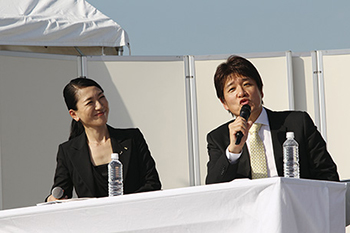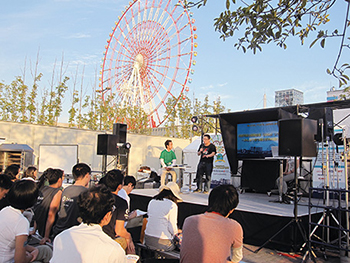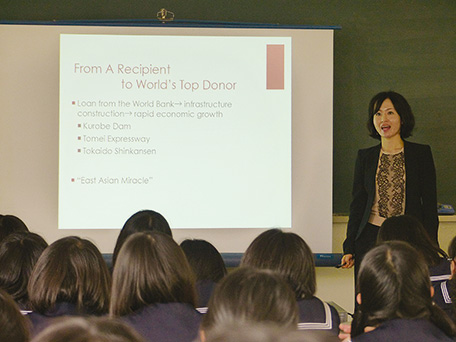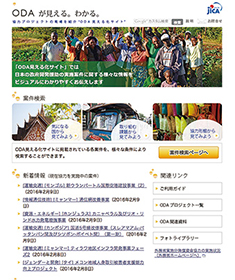4. Efforts for Strengthening the Foundations for the Implementation of Development Cooperation in Japan
(1) Efforts for information disclosure and promoting public understanding and support
The Development Cooperation Charter approved by the Cabinet in February 2015 highlights the importance of gaining public understanding and support for development cooperation.
MOFA and JICA are encouraging public participation in development cooperation at various levels and in a variety of ways, including: promotion of discussions and dialogues regarding development cooperation; promotion of development education; information disclosure regarding the current status of development cooperation; and dissemination of relevant information to various regions and a wide range of people. In addition, opportunities are provided for a broad range of Japanese nationals to directly participate in development assistance in developing countries and to experience ODA in the field. At the same time, Japan recognizes the importance of human resources development, research cooperation, and public-private partnership (PPP) in order to respond appropriately to development issues, which are becoming increasingly diversified and sophisticated. Similarly, it is important to enhance the understanding in the international community towards the concept of Japan’s development cooperation, and the cooperation with educational and research institutions, such as universities, as well as NGOs is becoming increasingly important.
Meanwhile, ensuring that Japanese assistance is known by many people in developing countries is an essential process for the implementation of ODA projects. Thus, Japanese diplomatic missions and overseas JICA offices are making coordinated efforts to conduct public relations activities in developing countries.
A. Strengthening public relations, information disclosure and information dissemination

“Let’s Learn with Osamu Hayashi-sensei about International Cooperation!”
Both MOFA and JICA have websites related to ODA,(Note 9) which are linked to each other, in an effort to release and disseminate accurate information to the wider public. In addition, MOFA publishes an ODA email magazine, which introduces actual stories of experiences and episodes about development cooperation in the field from the staff of overseas diplomatic missions and members of JICA.
Since FY1993, MOFA has been making efforts to increase Japanese people’s interest in international development cooperation and enhance their understanding by broadcasting relevant TV programs. In 2015, “Osamu Hayashi Explains ‘Our Small Steps that Open Up the World’” was aired as a three-part series by TV Tokyo’s six stations. This program introduced concrete examples of Japan’s international cooperation and ODA’s significance for Japan in an easy-to-understand manner, interweaving reports from developing countries and specific episodes. Aside from TV, information on international cooperation was disseminated through various media, including magazines and newspapers.

Workshop on Sustainable Development Goals (SDGs)
Japan’s largest international cooperation event called Global Festa JAPAN is held every year around the International Cooperation Day (October 6).(Note 10) In 2015, MOFA, JICA, and the Japan NGO Center for International Cooperation (JANIC) co-organized this event at Symbol Promenade in Odaiba, Tokyo on the weekend of October 3 and 4. A total of 274 organizations, including NGOs, international organizations, companies, and relevant ministries and agencies, took part, and approximately 101,300 people visited this event.

In addition, Japan conducts public relations activities overseas to promote a better understanding of Japan’s proactive international contribution through ODA. For example, Japan disseminates information to local news organizations by providing press releases when signings and handover ceremonies related to development cooperation take place. In addition, Japanese overseas diplomatic missions plan site-visit tours to Japan’s development cooperation projects for the local media to provide opportunities for them to report on Japan’s cooperation. Furthermore, Japanese diplomatic missions host various lectures and create websites, PR pamphlets, and other sources of information both in English and local languages.
B. Website for visualization of ODA
In October 2010, the ODA Mieru-ka Site (a website for the visualization of ODA) was launched within the JICA website to provide an easy-to-understand explanation of the current status of ODA projects and other aspects of the overall flow, and to further increase public understanding and support for ODA. Photographs, ex-ante/ex-post evaluations, and other information are being posted for enhanced information, in order to explain project overviews and processes from project formulation to completion with a focus on loan, grant, and technical cooperation projects around the world.
Likewise, the MOFA website publicizes summaries of the status of specific achievements and lessons learned from past Grant Assistance for Grass-Roots Human Security Projects and Cultural Grant Assistance projects, including projects which proved to be effective as well as those which proved to be deficient, in order to promote more effective implementation of ODA. Since FY2014, some of the information in these lists has been integrated into each project’s page on JICA’s ODA Mieru-ka Site in an effort to further increase convenience.
C. Promoting development education

A MOFA official delivers a lecture under the theme “The Attractiveness of Japan’s ODA” to 175 third-year students of the Aichi Prefectural Nishio Senior High School in May 2015.
MOFA sends its staff to junior-high and high schools, universities, NGOs and other places to give lectures on ODA (ODA Demae Koza) in order to provide information and explanation about Japan’s international development cooperation and ODA. To promote development education, JICA holds the Global Education Contest(Note 11) (JICA has been the main sponsor since FY2011) in which participants can showcase photos, global education practices and programs that can be utilized for development education. Similarly, to assist development education, in response to requests from schools and other organizations, JICA sends former JOCVs and others as lecturers for the International Cooperation Lecture to speak about life in developing countries and share stories of their experiences, aiming to promote cross-cultural and international understanding. JICA also organizes Visit JICA, which welcomes visits by schools to JICA Global Plaza, Nagoya Global Plaza, and domestic offices. In addition, the International Cooperation Experience Program mainly for high school students and the JICA Essay Contest on International Cooperation for Junior and High School Students are held. Furthermore, for teachers, there are various training programs such as the Training Program for Development Education Leaders and the Study Tour Program for Teachers in which teachers are dispatched to developing countries with the aim to utilize such experiences in their lessons.
D. On-site ODA experience
Providing as many people as possible with opportunities to experience development cooperation by visiting project sites to see the actual situation of ODA is one of the most effective ways to deepen public understanding of ODA. In this respect, Japan also places much emphasis on support for on-site ODA observation through study tours (e.g., university seminars), and support for sending teachers and officials from local governments to ODA project sites. Additionally, partnership with travel agencies to implement experience tours and observation tours are being strengthened. Furthermore, JICA launched a program called International Cooperation Reporters in 2011, which invites participants from the general public and provides them with opportunities to visit ODA project sites in person and report at various events after returning to Japan. Ten International Cooperation Reporters were sent to Rwanda and Jordan in August 2013 and to Ethiopia and Timor-Leste in September 2014, respectively, to observe Japan’s ODA projects in the field.
E. Promotion of discussion and dialogue
MOFA and JICA are holding information sessions throughout Japan regarding initiatives related to ODA such as supporting SMEs through ODA. Likewise, lectures and symposiums to introduce trends in international cooperation and Japan’s efforts are also held to engage in dialogue, as necessary, with citizens interested in foreign policy and ODA.
Furthermore, JICA organizes roundtables and lectures with representatives from local industries and governments, experts, and local university and school officials, utilizing its domestic offices such as regional centers and branch offices. By doing so, JICA aims to promote international cooperation coming from the different regions of Japan, thereby promoting the revitalization of regional economies.
(2) Developing human resources and solidifying the intellectual foundations for development cooperation
In FY2015, MOFA reformed the existing human resources program and launched the Program for Global Human Resource Development for Peacebuilding and Development to find, train, and develop the careers of peacebuilding and development professionals in a comprehensive manner. This program consists of: Primary Course, which provides domestic and overseas training for individuals wishing to pursue careers in the peacebuilding and development fields; and Mid-Career Course, which supports the career advancement of individuals who already have know-how and five or more years of experience in the peacebuilding and development fields. In addition, Career Development Support, which imparts skills and knowledge necessary to be appointed to positions, is offered to individuals seeking employment at international organizations and NGOs in the fields of peacebuilding and development.
Since 1997, JICA has offered internships to graduate students and other individuals who conduct research closely tied to development assistance, and wish to play an active role in this field in the future. In FY2014, 94 individuals were offered internships at various workplaces, including the worksites of development consultants. Furthermore, based on the 2002 recommendations of the Second Consultative Committee on ODA Reform, the International Cooperation Expert Center was established within JICA in 2003 to offer professionals with specialized knowledge and diverse experience, opportunities to use their talents at ministries and agencies, JICA, NGOs, and international organizations. As part of this program, JICA provides recruitment information related to international cooperation, human resource registration service, information on various training and seminars, career counseling, and other services on its PARTNER (Participatory Network for Expert Recruitment) website (http://partner.jica.go.jp/). In addition, JICA offers the Associate Expert Program and the Capacity Enhancement Training, among other types of training, to develop and secure international cooperation professionals.
Furthermore, the Senior Advisor System allows JICA to be staffed by experts with highly specialized capabilities and abundant work experience in developing countries. The JICA Research Institute, established in October 2008, conducts policy research based on actual experience in development cooperation using internationally recognized methodologies, while communicating with the governments of developing countries and the recipient communities of international development cooperation.
In order to make use of Japan’s strengths, the government will work with universities and research institutions and strive to reinforce the intellectual foundations to plan and disseminate development cooperation. This may take the form of joint policy research by researchers from Japan and developing countries or intellectual networking of such researchers.
- Note 9: MOFA http://www.mofa.go.jp/policy/oda/index.html JICA http://www.jica.go.jp/english/index.html
Website for the visualization of ODA: http://www.jica.go.jp/oda/ (Japanese only) - Note 10: International Cooperation Day: On October 6, 1954, a Cabinet decision was adopted regarding Japan’s accession to the Colombo Plan (the first international organization for developing country assistance to be established following World War II in 1951), leading to Japan’s initiation of economic cooperation. In this connection, October 6 was designated “International Cooperation Day” by the adoption of a Cabinet understanding in 1987.
- Note 11: Former name: Development Education/International Understanding Education Contest (renamed in FY2009)

